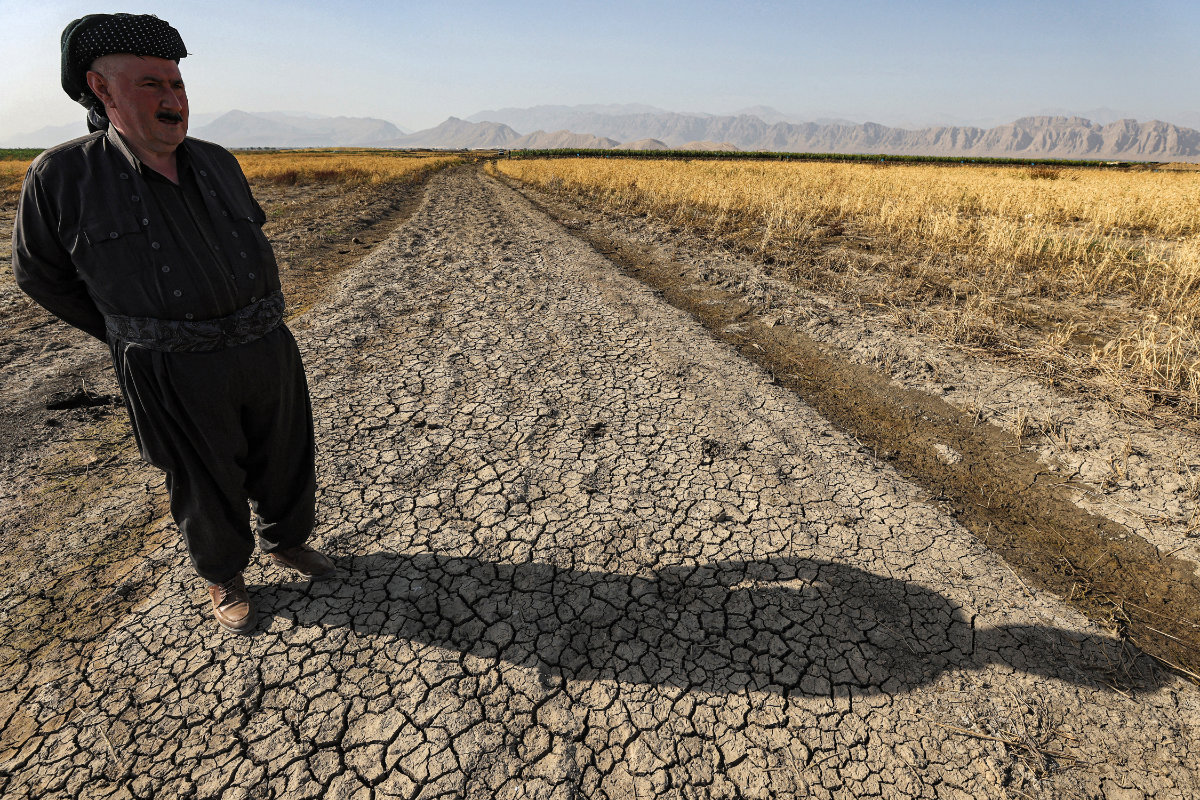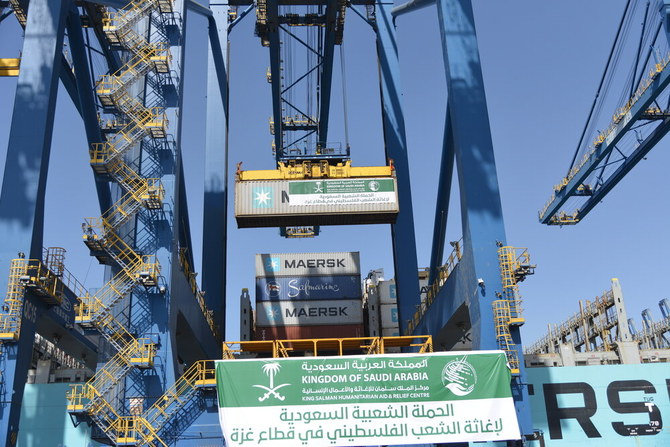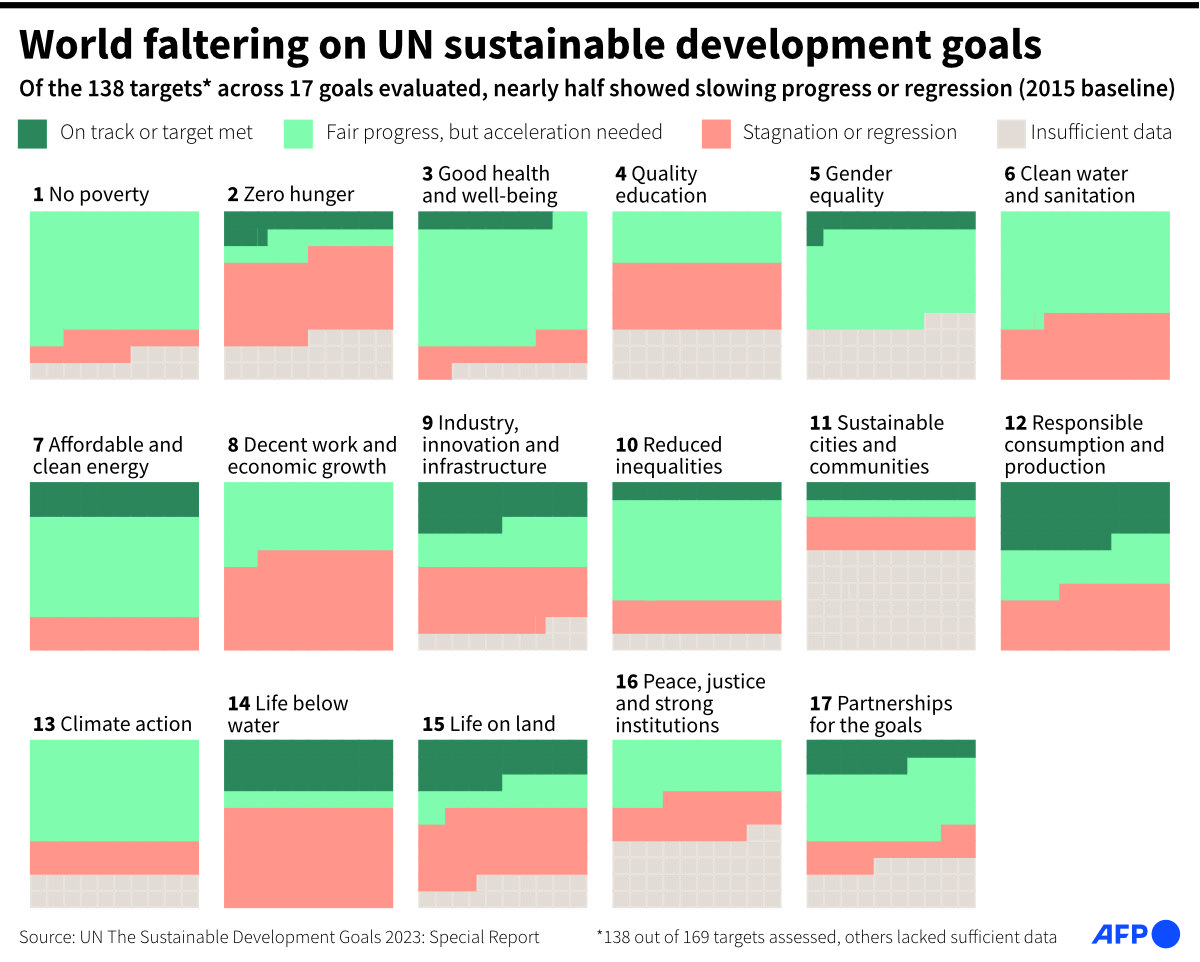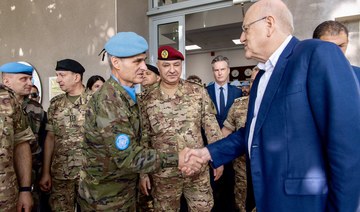MAROUN AL-RAS, Lebanon: While trying to fulfil their mandate to keep the peace, UN soldiers deployed along Lebanon’s border with Israel during the worst hostilities there in nearly 20 years have another urgent concern: keeping their own forces safe.
Since the outbreak of war between Israel and Hamas in Gaza seven weeks ago, troops from the UN peacekeeping force in Lebanon (UNIFIL) have repeatedly sheltered in bunkers during “intense shelling and rocket launches,” a senior commander said during a Reuters visit to a UNIFIL base in southern Lebanon.
“I’ve got to maintain force protection as a priority while also carrying out the mission,” said Lt. Col. Stephen MacEoin, battalion commander of the Irish and Polish soldiers stationed at Camp Shamrock in the village of Tiri, near Lebanon’s southern border with Israel.
The conflict in Gaza, some 200 km (124 miles) away to the south, has seen Israel and Iran-backed Hezbollah, an ally of Hamas, trading fire daily along the Lebanese-Israeli border.
Israeli attacks have killed about 100 people in Lebanon — 80 of them Hezbollah fighters — since Oct. 7.
MacEoin said he hoped the truce in Gaza between Hamas and Israel would be extended, as it was civilians “who suffer most” from conflict, be it in Lebanon or Gaza, and the violence in Gaza was linked to the situation in southern Lebanon.
“The concerns of the mission are that, after so many weeks of exchanges of fire, now we have a truce, a moment of calm, but that intensive changes of fire can really trigger a much wider cycle of conflict,” said UNIFIL spokesperson Andrea Tenenti.
“This is the real warning and danger that everyone is facing not only in the south but in the region.”
He said UNIFIL communicated with both sides in the flare-ups on the Lebanon-Israel border to try to “de-escalate tensions.”
No peacekeepers have been killed since the escalation of hostilities. But two peacekeepers have been injured in two separate incidents and UNIFIL compounds and bases have been hit and damaged by mortar shells several times, Tenenti told Reuters.
“We’ve had a lot of firing north and south of the Blue Line...a lot of close incidents,” MacEoin said, referring to a 120-km (74 mile) demarcation drawn by the United Nations that marks the line to which Israeli forces withdrew when they left south Lebanon in 2000.
In the latest incident, a UNIFIL patrol was hit by Israeli gunfire in the vicinity of Aytaroun of southern Lebanon, although there were no casualties. The UN force called the attack on “deeply troubling.”
UNIFIL was established by the Security Council in 1978 after Israel invaded Lebanon. Its scope and size were expanded after a 2006 war between Israel and Hezbollah that killed 1,200 people in Lebanon, mostly civilians, and 158 Israelis, mostly soldiers.
The force is deployed in southern Lebanon with the primary role of helping maintain international peace and security.
The mission says it currently has about 10,000 troops drawn from 47 countries, and about 800 civilian staff, stationed in 45 positions throughout a 1,060 square km (409 square mile) area between the Litani River and the Blue Line.
Last December, an Irish soldier serving in UNIFIL was killed after the UNIFIL vehicle he was traveling in was fired on as it traveled in southern Lebanon. Seven people were charged by a Lebanese military tribunal in January for his death, the first fatal attack on UN peacekeepers in Lebanon since 2015.
Calm had prevailed on the border since Hamas and Israel agreed a temporary truce that began on Nov. 24. But on Thursday morning the Israeli military said it intercepted an “aerial target” that crossed from Lebanon. Earlier on Thursday the two sides struck a last-minute agreement to extend the truce.
UN peacekeepers try to stay safe amid Lebanon-Israel border flare-ups
https://arab.news/vdzua
UN peacekeepers try to stay safe amid Lebanon-Israel border flare-ups

- Troops from the UNIFIL have repeatedly sheltered in bunkers during “intense shelling and rocket launches,” said Lt. Col. Stephen MacEoin
- He hoped the truce in Gaza between Hamas and Israel would be extended, as it was civilians “who suffer most”
At least 30 killed in Israeli strike on school, Gaza health officials say

- Deir Al-Balah is one of the areas most populated with displaced families, and said over 100 others were wounded
GAZA: At least 30 Palestinians were killed in an Israeli strike on a school in Deir al Balah in central Gaza, Palestinian health officials said, and the Israeli military said it had struck a Hamas command centre.
The Gaza health ministry and the Hamas-run government media office gave the toll for those killed in the strike on the school in Deir Al-Balah, one of the areas most populated with displaced families, and said over 100 others were wounded.
The Israeli military said in a statement it had targeted a "Hamas command and control center inside the Khadija school compound in central Gaza".
The statement said the school was being used to launch attacks against troops and as a weapons cache and that it warned civilians before the strike.
At Al-Aqsa Hospital in Deir Al-Balah, ambulances raced wounded Palestinians into the medical facility. Some of the wounded also arrived on foot, with their clothes stained with blood.
In previous such strikes that have hit civilian infrastructure, Israel's military has blamed the militant Islamist group Hamas for putting civilians in harm's way, accusing it of operating within densely populated neighbourhoods, schools and hospitals as cover. Hamas denies this.
Earlier on Saturday, Palestinian official media said that at least 14 Palestinians were killed by Israeli attacks since dawn in the southern city of Khan Younis and that their bodies were brought to Nasser Medical Complex.
The Israeli military told Palestinians to temporarily evacuate southern neighborhoods of Khan Younis so it could "forcefully operate" there, telling them to relocate to a humanitarian area in Al-Mawasi, a military statement said.
The military said its calls to evacuate were communicated to the population via several mediums in order to mitigate danger to civilians.
In Al-Bureij refugee camp, five Palestinians were killed earlier in an Israeli air strike on a house, while four others were killed in another strike on a house in Rafah, near the border with Egypt, medics said.
U.N. and humanitarian officials accuse Israel of using disproportionate force in the war and of failing to ensure civilians have safe places to go, which it denies.
On Friday the military said troops battled Palestinian fighters in Khan Younis, and destroyed tunnels and other infrastructure, as they sought to suppress small militant units that have continued to hit troops with mortar fire.
The fighting, more than nine months after the start of Israel's invasion of Gaza following the Hamas-led Oct. 7 attack, underlined the difficulty the Israeli Defence Forces (IDF) has in eliminating fighters of the group amid continued resistance.
On Friday the military said troops battled Palestinian fighters in Khan Younis, and destroyed tunnels and other infrastructure, as they sought to suppress small militant units that have continued to hit troops with mortar fire.
More than 39,000 Palestinians have been killed by Israeli strikes in the enclave, according to Gaza health authorities, who do not distinguish between fighters and non-combatants.
Israeli officials estimate that some 14,000 fighters from militant groups including Hamas and Islamic Jihad have been killed or taken prisoner, out of a force they estimated to number more than 25,000 at the start of the war.
Around 1,200 people were killed and 250 were taken hostage in the Oct. 7 raid on southern Israel, according to Israeli tallies.
Israel orders the evacuation of an area designated as a humanitarian zone in Gaza

- The war in Gaza has killed more than 39,100 Palestinians, according to the territory’s Health Ministry
KHAN YOUNIS: Israel’s military ordered the evacuation Saturday of a crowded part of Gaza designated as a humanitarian zone, saying it is planning an operation against Hamas militants in Khan Younis, including parts of Muwasi, a makeshift tent camp where thousands are seeking refuge.
The order comes in response to rocket fire that Israel says originates from the area. It’s the second evacuation issued in a week in an area designated for Palestinians fleeing other parts of Gaza. Many Palestinians have been uprooted multiple times in search of safety during Israel’s punishing air and ground campaign.
On Monday, after the evacuation order, multiple Israeli airstrikes hit around Khan Younis, killing at least 70 people, according to Gaza’s Health Ministry, citing figures from Nasser Hospital.
The area is part of a 60-square-kilometer (roughly 20-square-mile) “humanitarian zone” to which Israel has been telling Palestinians to flee to throughout the war. Much of the area is blanketed with tent camps that lack sanitation and medical facilities and have limited access to aid, United Nations and humanitarian groups say. About 1.8 million Palestinians are sheltering there, according to Israel’s estimates. That’s more than half Gaza’s pre-war population of 2.3 million.
The war in Gaza has killed more than 39,100 Palestinians, according to the territory’s Health Ministry, which doesn’t distinguish between combatants and civilians in its count. The UN estimated in February that some 17,000 children in the territory are now unaccompanied, and the number is likely to have grown since.
The war began with an assault by Hamas militants on southern Israel on Oct. 7 that killed 1,200 people, most of them civilians, and took about 250 hostages. About 115 are still in Gaza, about a third of them believed to be dead, according to Israeli authorities.
WHO sends over 1 mln polio vaccines to Gaza to protect children

- Israel’s military said it would start offering the vaccine to soldiers in the Gaza Strip after remnants of the virus were found in test samples
- Besides polio, the UN has reported an increase in cases of Hepatitis A, dysentery and gastroenteritis as sanitary conditions deteriorate in Gaza
GENEVA: The World Health Organization is sending more than one million polio vaccines to Gaza to be administered over the coming weeks to prevent children being infected after the virus was detected in sewage samples, its chief said on Friday.
“While no cases of polio have been recorded yet, without immediate action, it is just a matter of time before it reaches the thousands of children who have been left unprotected,” Director-General Tedros Adhanom Ghebreyesus said in an opinion piece in Britain’s The Guardian newspaper.
He wrote that children under five were most at risk from the viral disease, and especially infants under two since normal vaccination campaigns have been disrupted by more than nine months of conflict.
Poliomyelitis, which is spread mainly through the fecal-oral route, is a highly infectious virus that can invade the nervous system and cause paralysis. Cases of polio have declined by 99 percent worldwide since 1988 thanks to mass vaccination campaigns and efforts continue to eradicate it completely.
Israel’s military said on Sunday it would start offering the polio vaccine to soldiers serving in the Gaza Strip after remnants of the virus were found in test samples in the enclave.
Besides polio, the UN reported last week a widespread increase in cases of Hepatitis A, dysentery and gastroenteritis as sanitary conditions deteriorate in Gaza, with sewage spilling into the streets near some camps for displaced people.
How climate change is exacerbating food insecurity, with dangerous consequences for import-reliant Middle East

- UN report show nations are falling well short of achieving the Sustainable Development Goal of eliminating hunger by 2030
- FAO expert warns that climate shocks could lead to more conflict in the region over limited access to water and resources
RIYADH: Global food insecurity is far worse than previously thought. That is the conclusion of the State of Food Security and Nutrition in the World 2024 report published this week by a coalition of UN entities, which found that efforts to tackle undernourishment had suffered serious setbacks.
As countries across the world fall significantly short of achieving the second UN Sustainable Development Goal of “zero hunger” by 2030, the report notes that climate change is increasingly recognized as a pivotal factor exacerbating hunger and food insecurity.

As a major food importer, the Middle East and North Africa region is considered especially vulnerable to climate-induced crop failures in source nations and the resulting imposition of protectionist tariffs and fluctuations in commodity prices.
“Climate change is a driver of food insecurity for the Middle East, where both the global shock and the local shock matter,” David Laborde, director of the Agrifood Economics and Policy Division at the Food and Agriculture Organization of the UN, told Arab News.
“Now, especially for the Middle East, I think that the global angle is important because the Middle East is importing a lot of food. Even if you don’t have a (climate) shock at home, if you don’t have a drought or flood at home — if it’s happened in Pakistan, if it’s happened in India, if it’s happened in Canada — the Middle East will feel it.”
Opinion
This section contains relevant reference points, placed in (Opinion field)
The State of Food Security and Nutrition in the World report has been compiled annually since 1999 by FAO, the International Fund for Agricultural Development, the UN Children’s Fund, the World Food Programme, and the World Health Organization to monitor global progress toward ending hunger.
During a recent event at the UN headquarters in New York, the report’s authors emphasized the urgent need for creative and fair solutions to address the financial shortfall for helping those nations experiencing severe hunger and malnutrition made worse by climate change.
In addition to climate change, the report found that factors like conflict and economic downturns are becoming increasingly frequent and severe, impacting the affordability of a healthy diet, unhealthy food environments, and inequality.

Indeed, food insecurity and malnutrition are intensifying due to persistent food price inflation, which has undermined economic progress globally.
“There is also an indirect effect that we should not neglect — how climate shock interacts with conflict,” said Laborde.
In North Africa, for example, negative climate shocks can lead to more conflict, “either because people start to compete for natural resources, access to water, or just because you may also have some people in your area that have nothing else to do,” he said.
“There are no jobs, they cannot work on their farm, and so they can join insurgencies or other elements.”
DID YOUKNOW?
Up to 757 million people endured hunger in 2023 — the equivalent of one in 11 worldwide and one in five in Africa.
Global prevalence of food insecurity has remained unchanged for three consecutive years, despite progress in Latin America.
There has been some improvement in the global prevalence of stunting and wasting among children under five.
In late 2021, G20 countries pledged to take $100 billion worth of unused Special Drawing Rights, held in the central banks of high-income countries and allocate them to middle- and low-income countries.
Since then, however, this pledged amount has fallen $13 billion short, with those countries with the worst economic conditions receiving less than 1 percent of this support.

Saudi Arabia is one of the countries that has exceeded its 20 percent pledge, alongside Australia, Canada, China, France, and Japan, while others have failed to reach 10 percent or have ceased engagement altogether.
“Saudi Arabia is a very large state in the Middle East, so what they do is important, but also they have a financial capacity that many other countries don’t,” said Laborde.
“It can be through their SDRs. It can also be through their sovereign fund because where you invest matters and how you invest matters to make the world more sustainable. So, I will say yes, prioritizing investment in low- and middle-income countries on food and security and nutrition-related programs can be important.

Although the prevalence of undernourishment in Saudi Arabia has fallen in recent years, the report shows that the rate of stunting in children has actually increased by 1.4 percent in the past 10 years.
There has also been an increase in the rates of overweight children, obesity, and anemia in women as the population continues to grow. In this sense, it is not so much a lack of food but a dearth of healthy eating habits.
“Saudi Arabia is a good example where I would say traditional hunger and the lack of food … become less and less a problem, but other forms of malnutrition become actually what is important,” said Laborde.

In 2023, some 2.33 billion people worldwide faced moderate or severe food insecurity, and one in 11 people faced hunger, made worse by various factors such as economic decline and climate change.
The affordability of healthy diets is also a critical issue, particularly in low-income countries where more than 71 percent of the population cannot afford adequate nutrition.
In countries like Saudi Arabia where overeating is a rising issue, Laborde suggests that proper investment in nutrition and health education as well as policy adaptation may be the way to go.
While the Kingdom continues to extend support to countries in crisis, including Palestine, Sudan, and Yemen, through its humanitarian arm KSrelief, these states continue to grapple with dire conditions. Gaza in particular has suffered as a result of the war with Israel.

“Even before the beginning of the conflict, especially at the end of last year, the situation in Palestine was complicated, both in terms of agricultural system (and) density of population. There was already a problem of malnutrition,” said Laborde.
“Now, something that is true everywhere, in Sudan, in Yemen, in Palestine, when you start to add conflict and military operations, the population suffers a lot because you can actually destroy production. You destroy access to water. But people also cannot go to the grocery shop when the truck or the ship bringing food is disrupted.”
While Palestine and Sudan are the extreme cases, there are still approximately 733 million people worldwide facing hunger, marking a continuation of the high levels observed over the past three years.

“On the ground, we work with the World Food Programme (and) with other organizations, aimed at bringing food to the people in need in Palestine,” Laborde said of FAO’s work. “Before the conflict and after, we will also be working on rebuilding things that need to be rebuilt. But without peace, there are limited things we can do.”
FAO helps food-insecure nations by bringing better seeds, animals, technologies, and irrigation solutions to develop production systems, while also working to protect livestock from pests and disease by providing veterinary services and creating incentives for countries to adopt better policies.
The report’s projections for 2030 suggest that around 582 million people will continue to suffer from chronic undernourishment, half of them in Africa. This mirrors levels observed in 2015 when the SDGs were adopted, indicating a plateau in progress.

The report emphasizes the need to create better systems of financial distribution as per this year’s theme: “Financing to end hunger, food insecurity and all forms of malnutrition.”
“In 2022, there were a lot of headlines about global hunger, but today, this has more or less disappeared when the numbers and the people that are hungry have not disappeared,” said Laborde, referring to the detrimental impact of the war in Ukraine on world food prices.
“We have to say that we are not delivering on the promises that policymakers have made. The world today produces enough food, so it’s much more about how we distribute it, how we give access. It’s a man-made problem, and so it should be a man-made solution.”

Khan Yunis fighting displaces 180,000 Gazans in four days: UN

- Israel has killed at least 39,175 Palestinians in Gaza, according to the Hamas-run territory’s health ministry
KHAN YUNIS, Palestinian Territories: More than 180,000 Palestinians have fled fierce fighting around the southern Gaza city of Khan Yunis in four days, the United Nations said Friday, after an Israeli operation to extract captives’ bodies from the area.
Recent “intensified hostilities” in the Khan Yunis area, more than nine months into the Israel-Hamas war, have fueled “new waves of internal displacement across Gaza,” said the UN humanitarian agency, OCHA.
It said “about 182,000 people” have been displaced from central and eastern Khan Yunis between Monday and Thursday, and hundreds are “stranded in eastern Khan Yunis.”
The Israeli military on Monday ordered the evacuation of parts of the southern city, announcing its forces would “forcefully operate” there, including in an area previously declared a safe humanitarian zone.
On Wednesday, Israel said five bodies of captives seized during Hamas’s October 7 attack that triggered the war had been recovered from the area.
Israel’s military said on Friday that its forces had “eliminated approximately 100 terrorists” in the city this week.
Israel’s military chief, Lt. Gen. Herzi Halevi said the captives’ bodies were pulled from underground tunnels and walls in “a hidden place.”
Troops “were near those fallen bodies in the past, we did not know how to reach them” until this week, Halevi said in a statement.
Witnesses and rescuers said heavy battles continued around eastern Khan Yunis on Friday. The Nasser Hospital said 26 bodies were brought to the medical site.
The October 7 attack on southern Israel resulted in the deaths of 1,197 people, most of them civilians, according to an AFP tally based on official Israeli figures.
Out of 251 people taken hostage that day, 111 are still held in the Gaza Strip, including 39 the military says are dead.
Israel’s retaliatory offensive against Hamas has killed at least 39,175 Palestinians in Gaza, according to the Hamas-run territory’s health ministry.
According to UN figures, the vast majority of Gaza’s 2.4 million people have been displaced at least once by the fighting.






















